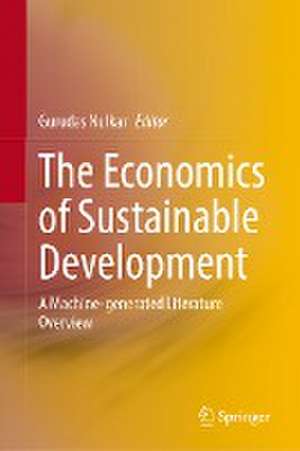The Economics of Sustainable Development: A Machine-generated Literature Overview
Editat de Gurudas Nulkaren Limba Engleză Hardback – 29 sep 2024
This book is a machine-generated literature overview that explores the interlinkages between communities, both rural and urban, and how they are dependent on natural resources and ecosystem services for livelihoods. With increasing urbanization and changing land use, sourcing food, fuel, and other basic needs from forests and grasslands is turning into a significant challenge, especially in the developing world where they have to balance regional aspirations against the environmental impact and legacy for forthcoming generations. As sources of sustainable livelihoods decline, it affects their ability to overcome poverty. Furthermore, economic impacts on the natural capital can undermine the long-term sustainability of communities, and negatively affect their health and well-being.
To ensure economic growth and sustainable livelihoods, it is imperative to rethink how economic growth and agriculture can reduce their impacts on the natural environment. How dowe integrate economic, social, and environmental aspects into our economy? The book will discuss aspects of sustainable consumption, conservation of ecosystems and biodiversity, and making rural communities resilient to the impacts of climate change. By recognizing the economic value of ecosystem services, decision-makers can better understand the benefits and costs of different land uses and resource management practices and make more informed choices that promote sustainable livelihoods and natural capital conservation. The book will be a great resource for policy-makers, students of economics and sustainable development, non-governmental organizations working in this field, and corporate managers who are responsible for allotting budgets towards corporate social responsibility programs.
Preț: 1020.60 lei
Preț vechi: 1244.64 lei
-18% Nou
Puncte Express: 1531
Preț estimativ în valută:
195.29€ • 203.50$ • 161.70£
195.29€ • 203.50$ • 161.70£
Carte tipărită la comandă
Livrare economică 03-17 aprilie
Preluare comenzi: 021 569.72.76
Specificații
ISBN-13: 9789819973781
ISBN-10: 9819973783
Pagini: 250
Ilustrații: Approx. 250 p.
Dimensiuni: 155 x 235 mm
Greutate: 1.04 kg
Ediția:2024
Editura: Springer Nature Singapore
Colecția Springer
Locul publicării:Singapore, Singapore
ISBN-10: 9819973783
Pagini: 250
Ilustrații: Approx. 250 p.
Dimensiuni: 155 x 235 mm
Greutate: 1.04 kg
Ediția:2024
Editura: Springer Nature Singapore
Colecția Springer
Locul publicării:Singapore, Singapore
Cuprins
Part I Agriculture, food and nutrition.- 1. Intensive farming and its effects on natural ecosystems.- 2.Farmer poverty in India – drivers and challenges.- 3.Alternative farming for sustainable development.- 4.Traditional knowledge and sustainable farming.- 5.Food security, nutrition, and hunger.- Part II Economy for well-being.- 6.Unsustainable part of economic growth.- 7.Decoupling economic growth from Natural resource consumption.- 8. Accounting stocks and flows of natural capital.- 9.Green jobs.- 10.Bioeconomy.- 11.Greening our cities.- 12.Alternative Livelihoods: Nature-based solutions and ecological restoration.- 13.Measures of social well-being.
Notă biografică
Professor Gurudas Nulkar is Professor and Director of the Centre for Sustainable Development at the Gokhale Institute of Politics and Economics, Pune, India. He teaches undergraduate and graduate students, supervises PhD students, and is engaged in empirical and applied research in the field of ecological economics and sustainable development. He has an experience of 19 years working in the industry, after which he shifted to academia where he has been teaching for the last 13 years. His doctoral research was in environmental sustainability within industrial ecosystems. This was followed by Post-doctoral Endeavour Fellowship of the Government of Australia. He has published four books, of which three are in Marathi language and one in English. His Marathi book "Anartha Shashtra" has received the Maharashtra State Literature Award in the category “C.D.Deshmukh Award for Economic Literature”. His papers have been published in reputed journals and as research reports. Prof. Nulkar has served as an expert on several committees and panels, including UN-ESCAP program, Government of Maharashtra, and Pune Divisional Commissioner’s Office. He contributed to the Pune Metropolitan Region Development Authority Draft Plan as an ecological expert. He is a member of Pune International Centre, Energy, Environment and Climate Change, and a member of the Indian Society for Ecological Economics (INSEE). He has completed several projects funded by organisations such as World Resources Institute, Global Forest Watch, Centre for Environmental Education, UNICEF, and others.
Textul de pe ultima copertă
This book is a machine-generated literature overview that explores the interlinkages between communities, both rural and urban, and how they are dependent on natural resources and ecosystem services for livelihoods. With increasing urbanization and changing land use, sourcing food, fuel, and other basic needs from forests and grasslands is turning into a significant challenge, especially in the developing world where they have to balance regional aspirations against the environmental impact and legacy for forthcoming generations. As sources of sustainable livelihoods decline, it affects their ability to overcome poverty. Furthermore, economic impacts on the natural capital can undermine the long-term sustainability of communities, and negatively affect their health and well-being.
To ensure economic growth and sustainable livelihoods, it is imperative to rethink how economic growth and agriculture can reduce their impacts on the natural environment. How do we integrate economic, social, and environmental aspects into our economy? The book will discuss aspects of sustainable consumption, conservation of ecosystems and biodiversity, and making rural communities resilient to the impacts of climate change. By recognizing the economic value of ecosystem services, decision-makers can better understand the benefits and costs of different land uses and resource management practices and make more informed choices that promote sustainable livelihoods and natural capital conservation. The book will be a great resource for policy-makers, students of economics and sustainable development, non-governmental organizations working in this field, and corporate managers who are responsible for allotting budgets towards corporate social responsibility programs.
Caracteristici
Machine-generated overview highlighting decoupling of economic growth from natural resource consumption Delves into the rural-urban divide to look at sustainable livelihoods Explores diverse topics like agriculture, food security, wellbeing, green jobs, bioeconomy, alternative livelihoods
